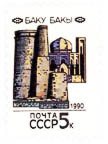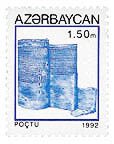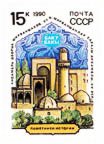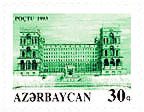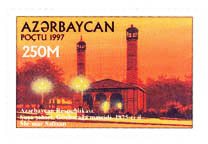|

Winter 1998 (6.4)
Pages 8-10
-
- Reader's Forum
Presidential Elections in Azerbaijan
-Ambassador to U.S. Hafiz Pashayev - Azer,11
- My
Name and Your Journal -
Azer,11
- My
Own Heritage - A. Marjani
- Open
Letter to President Khatami - Javad
Heyat and other Azerbaijani intellectuals in Iran
- Warning:
No Band-Aids on Bone Fractures
- More
than Information-Connections - Shovgi
R. Agayev
Presidential
Elections in Azerbaijan
Ambassador Hafiz Pashayev's letter was published in the Washington
Post on November 3, 1998.
The Washington Post's October 17, 1998 editorial "Missed
Chance in Baku," concerning the Azerbaijan presidential
election, reminds me of the proverbial question about whether
the glass is half full or half empty. The Post obviously has
chosen to declare Azerbaijan's election half-empty. A more sober
judgment, in my opinion, would have declared the election half
full.
We did not expect perfect elections, but almost all observers
agree that this election represented significant improvements
over previous elections. Election laws were improved, censorship
was abolished, each candidate received free time on national
television, open campaigning was encouraged, opposition candidates
flourished, and hundreds of election monitors and observers were
invited to witness the election. And while irregularities were
reported, no one really questions the outcome.
With reference to the oft-cited criticism of the International
Republican Institute (IRI), it is worth mentioning that long-term
monitors usually sound much more constructive and understanding.
While we appreciate IRI's comments, we would have welcomed the
Institute's full-scale participation in the educational pre-election
process.
Hafiz Pashayev
Ambassador, Embassy of Azerbaijan
Washington, D.C.
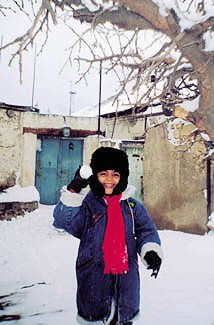  My Name and Your Journal My Name and Your Journal
You have not seen me and you do not know who I am, but I know
you and love you very much because you like Azerbaijan. When
I look through Azerbaijan International, I see how great and
sincere your love is. Besides, I like this journal because its
title is related to my name which is Azer which means Azerbaijan.
So this is my journal. I am 11 years old.
I would like to ask you to publish lots of children's pages with
colorful pictures. I will send you mine. I am fond of Disney
characters and always try to draw them. But doctors do not allow
me to work more than two hours at a time. They are afraid that
my blood pressure will fall. I have a blood illness since birth
[thalassemia]. I go for blood transfusions twice a month.
Left: Azer, 11. "My name means Azerbaijan!"
Oh, I wish you knew how agonizing
and dangerous those blood transfusions are. That is why whenever
I go to the clinic for a transfusion, I kiss my father and mother
and sister because anything could happen.
There is only one way out and that is to have a bone marrow operation.
It is a very complicated process. I am sorry that there are no
hospitals and no qualified specialists in my country. Such hospitals
only exist in Italy and the U.S. Some children like me have already
been treated in the U.S. and they will survive. Whether you can
help me or not, I shall love you until I die because you love
Azerbaijan.
Azer, Age 11
Baku
Editor's Note: Thalassemia is a genetic disorder that
afflicts more than 2,000 children in Azerbaijan. With the fall
of the Soviet Union came the collapse of the medical situation
as well, which is especially difficult for families of children
with chronic diseases like hemophilia, leukemia and thalassemia.
Tragically, children
with thalassemia rarely live past their teens in Azerbaijan.
The frequent blood transfusions, which are risky in themselves,
result in an excessive intake of iron which severely damages
the spleen. To date, the only medical cure is via a bone marrow
transplant operation [See "The Crisis
of Beta Thalassemia in Azerbaijan" in AI 3:4, Winter
1995].
My
Own Heritage
I was a student in Baku
shortly after the Soviet Union collapsed in 1991 and Azerbaijan
began its journey to independence. Since I'm from Tabriz in Southern
Azerbaijan (Iran), I can say up to that time, I didn't really
know what Azerbaijan was, nor who I was as an Azerbaijani young
person.
Azerbaijan used to be one large region until 1828 when it was
separated into two parts between Russia and Iran. Beginning in
the 1920s, when Soviet power was established, all communication
and transportation was forbidden between Azerbaijanis in the
North and South. People were separated from each other. There
was virtually no contact even though many of us had relatives
living on the other side, including spouses, brothers, sisters,
children. With the passage of time-half a century-the gap became
even wider.
From childhood, I remember my family driving up to the Azerbaijan
border of the USSR and gazing across the Araz River into the
forest of trees beyond. It was such a mysterious place for us.
We wondered: "What is going on over there? What has happened
to them?" But even lingering too long to stare and think
on these things was forbidden. I've heard that people from the
North used to have the same experiences as we did.
My parents are Azerbaijanis.
They spoke Azeri at home but they wanted to give me all the advantages
of becoming fluent in the dominant language of the country I
was living in. Therefore, I didn't grow up learning to speak
Azeri though I did understand it. In school, all instruction
was, and still is, given in Persian. That's the reason why I
didn't really have any idea what it meant to be an Azerbaijani
and to have a culture of my own that was not Persian.
When I was 20 years old, I transferred to the Medical School of the State University
of Baku. I had long dreamed of becoming a dentist.
During those years in Baku (1993-96), I spent all my time becoming
immersed in this new culture which was really mine. I found Azerbaijanis
so culturally rich and so talented in music. In my opinion the
cultural development of Azerbaijanis on my side of the Araz (at
least 25-30 million people) which is, at least, three times that
of the Republic of Azerbaijan, has remained at a very primitive
level although we share the same roots.
Now I'm back in Iran and I've set up my own practice as a dentist.
I'm beginning to understand how precious and valuable my own
culture and traditions are and how warm and hospitable my people
are. It makes me proud to know that I belong to Azerbaijan now.
I'm beginning to understand these things.
I keep in contact with my friends in Baku and try to understand
the issues and incidents that are going on there. That's where
your magazine comes in. I've been reading it for six years though
I've never written you. Thanks so much for helping me become
more conscious of my own heritage and identity.
A. Marjani
Tabriz, Iran
The following letter in defense
of the Azerbaijani
language was written on May 5, 1998 and sent to President
Khatami of the Islamic Republic of Iran after being signed by
54 Azerbaijani intellectuals living in Iran. Note that the population
of Azerbaijanis living there is estimated at 25 to 30 million
people or almost half of the entire population in Iran or, at
least three times the population of the Republic of Azerbaijan.
In Iran, the Azerbaijani language is called "Azerbaijani-Turki"
or simply "Turki."
Letter
to President Khatami of Iran
Azerbaijani-Turki speaking
Muslims and compatriots comprise nearly half of the population
of this country [Iran]. They have courageously participated in
the historical creation of the Constitutional Revolution [1905],
the Islamic Revolution [1979] and the war imposed by Iraq [1981-89].
Like other Iranians, their youth have shed their blood to protect
the independence and the honor of this country.
Turki language and literature is a major part of the culture
of this land, and it deserves to be protected like any other
cultural heritage of this country. Nor is this language, like
Persian, confined to the borders of Iran. It has spread to various
regions of the world and is used both in oral and written discourse
as the language of those lands.
As is known, Islam was spread throughout the world via three
major languages-Arabic, Persian and Turkish. That is why Turkish
is one of the languages of Islam. The Azerbaijani-Turki language
spoken by the majority of Turkic Iranians is substantially the
same as the Azeri used in the Republic of Azerbaijan. Essentially
these lands were part of Iran until the Gajar period, when they
became separated due to the unlawful treaties of Golestan and
Turkmenchai [1813 and 1828] when the Northern part [now Republic
of Azerbaijan] became part of the Russian Empire.
All Azerbaijanis view the Persian language as the cultural bridge
that connects them to all other Iranians. Azerbaijanis have been
the creators of several literary masterpieces in the Persian
language throughout history. An Azerbaijani style has even been
identified in Persian literature.
However, one of the vestiges of the era of the Pahlavi Dynasty
is the cultural prejudice related to the use of the Turki language
in Iran. It is the reason for the present-day indifference by
officials to one of the most integral parts of the culture of
our country. Outside Iran's borders, thousands of books are published
in the Azerbaijani language.
Despite the fact that this language is taught in so many countries,
unfortunately, in Iran, it is not taught in a single educational
center. For example, at the University of Tabriz, in addition
to Persian, degrees and courses are offered in Arabic, English,
French, German, Russian, Kurdish and even Esperanto but not a
single course exists in the native language of the people of
this city.
At the same time, other religious minorities, such as the Armenian
community, have programs in two universities-Isfahan and Tehran-where
the Armenian language and literature are taught. In addition,
their children are allowed to study in Armenian schools in their
own language.
Furthermore, community discourse is generally conducted in a
language other than our mother tongue. Our media (radio, television,
and press), our commercial signs, wedding and funeral announcements
and even our grave markers are in a language other than our mother
tongue. And if, on occasion, something is expressed in Turki
on the local radio or television, invariably the style is incorrect
and incomprehensible as it is written by people who, though well-intentioned,
are not specialists in the Turki language.
Consequently, these programs are becoming more and more a humiliation
to our people as they are destroying the grammatical structure
of our language. In summary, our language is more properly spoken
on foreign radio stations than on our own. It is a fact that
Iran is the only country in the world where the mother tongue
of millions of people is neglected.
Mr. President, some would suggest that Azerbaijanis themselves
are indifferent to their own language and that some of them instruct
their children only in Persian. This may be true for a few, who,
for example, like some Persians, encourage their children to
excel in English more than their own language. Nevertheless,
the preservation of the Turki language has been encouraged tremendously
by the attention and affection of the majority of Azerbaijanis,
its intellectuals and its honorable clergy. All over Azerbaijani
and other Turkic regions of our country, the clergy address their
followers and lead the ceremonial prayers in Turki. Turki is
one of the oldest languages in the world and has ancient roots
in Iran.
In conclusion, we apologize for our long letter, but we ask our
honorable brother to consider our concerns and use his authority
to eliminate the unfair and non-Islamic cultural discrimination
and to follow justice in ruling about this matter. Without a
doubt, neglecting our people's language and literature is against
the Constitution of the Islamic Republic of Iran (Article 15)
which addresses the issue of ethnic languages. We trust that
with your official help and consideration, the legitimate requests
below will be achieved:
(1) The official endorsement of an obligatory educational program
of Turki in all schools and high schools in regions where there
is a Turki-speaking population. This should be carried out in
parallel with the Persian language;
(2) The production and airing of radio and television programs
conducted in Turki by people who are specialists in the language.
Again, this should be carried out in parallel with Persian language
programs;
(3) The establishment of Departments of Turki Language and Literature
in universities;
(4) The encouragement to develop Turki literature for children
via the Center for the Development of Children and Youth.
Respectfully,
Signed by 54 of the leading Azerbaijani intellectuals in Iran,
including:
Dr. Mohammad Taghi Zehtabi, Dr. Javad Heyat (1)
Dr. Gadi Golkariyan, Professor Hamid Mohammadzadeh
Karim Mashrootehchi, Manoochehr Azizi, Behzad Behzadi (2) Mohammad
Farzaneh, Samad Sardornia, Nooshin R. Moosavi
(1) Dr. Javad
Heyat is a surgeon who has edited and published the "Varlig"
journal for nearly 20 years. This publication, which is in Turki
(Arabic script), concentrates on Azerbaijani-related topics;
(2) Dr. Behzad Behzadi is an attorney at law who compiled and
edited the first extensive Azerbaijani-Persian Dictionary (Arabic
script), 1,144 pages, Tehran, 1990.
Warning:
No Band-Aids on Bone Fractures
The following letter was published in the Washington Post on
November 7, 1998.
The Post's excellent coverage
of the competition for the Caspian oil omits the extent of NATO's
military involvement in the region ("U.S., Turkey Turn Up
Pressure for Caspian Basin Oil Pipeline," October 28; "The
Struggle for Caspian Oil," October 4; "No Peace in
the Pipeline," September 2).
Azerbaijan and Georgia are using NATO's Partnership for Peace
program as a vehicle to engage the alliance in protecting the
Caspian oil pipelines against local insurgents. NATO's "Infrastructure
Logistics & Civil Emergency Planning Division" has been
providing advice to Azerbaijan on environmental security, i.e.,
handling oil spills and similar accidents.
The alliance now is considering a request from Azerbaijan to
expand the cooperation to include "operational security,"
meaning cooperation on actually protecting or defending the Caucasus
pipelines. NATO's role would consist of expert visits and consultations.
Although NATO has no plans to offer actual military assistance
to the Caucasus pipelines, the alliance may provide its expertise
to local militaries. Georgia, Ukraine, Azerbaijan and Moldova
are discussing a joint battalion tasked with protecting the pipelines.
Protection for oil facilities is needed because the Caucasus
region-and Georgia in particular-is rife with secessionist rebellions
that could target the pipelines. The coup in Georgia in October,
for instance, forced a two-day suspension in the construction
of the Baku-Supsa pipeline. The region's problems run deep, and
for the West to offer military assistance for pipeline protection
is akin to putting a Band-Aid on a bone fracture. Moreover, NATO
advisers are likely to be viewed as provocation by Russia and
Iran, which oppose U.S.-backed plans to build a pipeline from
Azerbaijan to Turkey.
What is needed is a diplomatic effort to settle the Nagorno-Karabakh,
Abkhazia and South Ossetia conflicts. Without a political resolution
to these conflicts, the region never will be stable-not just
for the pipelines but also for all the people living there.
Tomas Valasek
Washington
More
than Information, AI is Connections
I'm a 15-year-old senior at a private Christian high school in
Phoenix, Arizona. I started reading your magazine before I came
to the United States. For me, it used to be nothing more than
just a chance to improve my English skills. But here I am now,
on the other side of the world, very far away from my home and
there's not much which lets me know what is going on over there.
Even the "small gossips" that I sometimes hear often
turn out to be just that-gossip. There is no source that would
give me a clear picture of what is going on in my country except
yours.
You probably get a bunch of letters saying that you're an excellent
source for keeping appraised of things going on in Azerbaijan,
but for people like me, you are more than that. Through you,
those of us who are away from Azerbaijan can create some sort
of invisible connection with each other and with those who are
back at home, and in that way we never let the Azerbaijani nation
fall apart. Also every edition of your magazine is a new wonderful
trip back to Azerbaijan.
Various circumstances have scattered our nation throughout the
world. Often the connection between those who are away and those
who are at home is missing. Each time, I read Readers' Forum,
I see that you are the basis of this connection for so many people
all over the world. Thank you very much for doing that for us.
Way to go, guys!
Shovgi R. Agayev
Phoenix, Arizona,
October 26, 1998
From Azerbaijan International (6.4) Winter 1998.
© Azerbaijan International 1998. All rights reserved.
Back to Index
AI 6.4 (Winter 1998)
AI Home
| Magazine
Choice | Topics
| Store
| Contact
us
|

